Dom Testa's Blog, page 2
May 5, 2023
Celebrating Success

Have you ever accomplished something that should’ve made you feel proud, and yet you just weren’t able to enjoy it? It somehow wasn’t good enough. Or, if you celebrated your success, the joy was short-lived and you quickly fell back into a mindset of “I can do better than that.”
Until I read two separate articles about the phenomenon, I thought it was simply part of my own hyper-driven personality. But it turns out, it’s a fairly common experience.
Many of us, it seems, have succeeded—often in more than one field or in more than one segment of life—and yet we either don’t see it as a success, or we’re too busy looking ahead to the next challenge, preparing a strategy for conquering the next mountain. We don’t take the time to enjoy what we’ve accomplished.
The usual experts have weighed in and offered a plethora of explanations for this attitude. Some claim it’s similar to the concept of imposter syndrome, where you feel inadequate despite success, that somehow you’re not truly worthy of that success, as if you simply got lucky.
Some express concern that this lack of appreciation is a product of the “everyone gets a trophy” style of parenting. When a child’s been raised to believe everything they’re doing is the greatest feat of all time, then naturally a day will come when they see through the bullshit and realize their accomplishments either aren’t any better than those of anyone else, or they’re not really accomplishments at all.
Could this be true for younger generations? Maybe. But it certainly doesn’t apply to the rest of us. Hell, when I was young we were lucky if we got anything for winning a competition. One of my little league baseball teams won the all-around championship and our reward was a free meal at a nearby truck stop. I’m not kidding. So while this theory may have some elements of truth to it, I think the problem goes deeper than having parents who coddle.
Some go so far as to say it’s a sign of depression. I’m not qualified to offer an educated response to this, except to say I’ve read the arguments for it and they make sense to me. It could, indeed, be a component of depression. Anyone who has fallen into this darkness recognizes the symptom, the inability to properly value yourself or your abilities. But, again, while it certainly can contribute to some of the cases, I don’t think this diagnosis covers everyone.
At some point, we may have to come to grips with the fact that we might never know the exact Why. It’s likely a case where one size does not fit all.

Speaking personally, what makes it even worse is the simple fact that I recognize this pattern of thinking in myself. I can stand outside myself and see that I’m unwilling or unable to celebrate successes because I’m either too focused on the next book/radio show/anything, or I flat-out refuse to acknowledge that it’s actually a success. There are people close to me who express surprise or downright frustration that I shrug off any and all signs of success.
Perhaps you’re the same way. You know in your heart you should be happy for an accomplishment, and yet you’re reluctant to stop, relax, look back, and—I think this is key—be kind to yourself.
Because really, that’s what this boils down to. I was raised with a strong work ethic. I was brought up to strive. I’ve been competitive by nature since I can remember. And while I don’t regret any of these traits—indeed, I’m grateful for them—I have to wonder if the problem is that I’ve never balanced these qualities with an equal measure of self-kindness. While I strongly believe it’s the drive and competitive nature that’s ultimately delivered the successes I’ve experienced, I’ll admit I suck at celebrating them. Balance, often touted as the tonic for a happy life in general, is obviously the prescription here.
The know-it-alls say awareness is the first step toward transformation. Alcoholics must begin to get help by acknowledging their disease; for that matter, any type of addiction is tough to overcome unless one accepts that the problem is real.
While I by no means am implying that the inability to appreciate success is as damaging as a drug or alcohol addiction, I believe it’s nonetheless harmful. Our mental health is vitally important, too, and the goal of happiness is pretty tough to achieve when we hobble our own progress.
Now that we’ve shone a light upon the issue, maybe you and I can take that knowledge and funnel it into transforming ourselves. We can shut off the treadmill for a few minutes, temporarily shift our minds from drive to neutral, and embrace the peace that comes from knowing—really knowing—that a job was well done.
* * *

If you enjoyed this piece, consider buying Dom a tea or a beer right here. He would consider that a smashing success.
April 15, 2023
Classic, man

I’ve recently dipped my toe back into the classical music pool.
To be sure, I’m no expert. I couldn’t identify Johann Strauss from Levi Straus—not yet, anyway.
But the places where I go to write often have really, really, really bad music playing. In the past, I’ve put on headphones and masked the crap with white or brown noise tracks. Then, the other day, I decided to try classical again.
There’s a Spotify playlist that offers what they call Classical Essentials. It’s got about 16 hours of the stuff. I’ve had it on shuffle, drowning out the noise around me, and I gotta say . . . I’m realizing that I misjudged the ol’ boys.
Perhaps I wasn’t in the right mental space the last time I sampled classical. Now, for whatever reason, it’s connecting with me on some level. And not just as a tool to block out bad pop music.
I have to concentrate when I write, so songs with lyrics never work. And listen, I know I’m not the first person to work to a classical background. I’m saying that I tried before—didn’t care for it—and moved on. Now, it’s working for me.
Why now?
There’s also the question of WHY it suddenly works. Is it a maturity thing? Do you just need to be ready for the classics? I also wonder if this will be a temporary fascination, like my fascination with Paula Nixon my senior year. That lasted about a month.
I’m hoping my dance with Debussy makes it beyond that mark. Here’s hoping the masters can string me along a bit longer.
Is it somehow tied in with the particular project I’m toiling over at the moment? Is there something about a pleasant cello and viola combo that provides the proper background when writing stories about government assassins taking out bad guys? Maybe. Part of the balancing act, perhaps?
Could it be I’ve finally learned to flat-out appreciate the genius of these composers? I kinda think that’s it, actually. They truly produced magical, inspired pieces of music that often get overlooked by the masses today. Hell, even back then—some of these guys got thrown into unmarked graves, for chrissakes.
Whatever the reason, it’s been refreshing and certainly helpful. I’ve cranked out thousands of words with this new background of sound. I may even have to write them into one of the stories. Maybe my spy, who normally in these novels is rocking out to 90s alt music, could drift over to a classical playlist for an assignment.
You do you
If you’re trying to create, the bottom line is this: Find whatever the hell works for you at the moment. And I think that’s the key: at the moment. It could be entirely different for your next project.
As long as it keeps you in your creative mode.
And keeps out Kesha. Am I right?

If you have your own playlist that helps you generate words by the bushel—whether it’s classical or not—consider buying Dom a tea or a beer right here. Maybe you both will create some badass art with Mozart.
April 11, 2023
The Death of Phone Calls
Here’s a subject I’m hesitant to bring up because it will invariably lead to charges of “luddite” or “grandpa” or some other slam. But let me tighten up the chin strap on my helmet and dive in:
Why are so many people adamant about continuing a text or email conversation that could be settled in a fraction of the time with a simple phone call?
(I already hear the groans, but this must be addressed.)

One of our IT specialists with the radio station sent me an email, asking about something technical in the studio. I answered with as much information as I could, but also suggested a quick phone call.
Twenty minutes later, the IT specialist wrote back again with another question I couldn’t quite grasp. I responded, again to the best of my ability, but really suggested a phone call.
Nope. Another email, 35 minutes later. Still muddy as hell. I was perplexed, the IT specialist was vague, and nothing was solved.
As I write this, the entire back-and-forth has involved a total of nine messages over the course of three hours, 37 minutes.
A phone call would’ve lasted, at most, four minutes.
The superior communication

I’m not averse to text messages, and I write and respond to dozens of emails every day.
But sometimes a phone call is—GASP!—superior.
And yet, for many people, it just will never happen. I wanna know why. What is it about a quick phone call that fills so many people with dread?
Yes, often a text will suffice. Yes, sometimes just one email will settle everything.
But when it’s obvious no communication is happening through these digital messages, why not just, you know, TALK?
I can’t be the only person who longs for a good old-fashioned conversation when four or five or thirty-five emails aren’t getting it done.
Have we become such cyborgs with our devices that all we know is punching out messages with our thumbs? Are we rapidly evolving into a creature that’ll have four thumbs and no vocal cords?
We just don’t like people
Maybe it’s something else. Maybe the reliance on gadgets coupled with two years of pandemic-induced solitude has made us absolutely detest the sound of another human’s voice. Maybe we just don’t LIKE people anymore, and the best we can offer is a hastily typed message—sort of like a modern version of “Talk to the hand.”
As I finish this quick post, it has now been just over four hours, and the IT specialist has gone radio silent.
I’m sitting here, my lonely phone on the table, waiting for a ring that’ll never come.

If you feel Dom’s pain and you, too, don’t mind an occasional phone call, consider buying him a tea or a beer right here. The coffee shop will be silent, filled with people sending text messages.
April 4, 2023
Serial Returners

Amazon announced they’re going to start tagging products that have a large number of returns. They’ll put some sort of badge on the product page, warning consumers that this choice comes with some risks—namely, that you might find the quality not up to par.
On the surface, it’s a good idea.
But the more I thought about it, the more I realized it only goes halfway.
Yes, there are plenty of shady companies putting out a tsunami of shitty products, secure in the knowledge that only a small percentage of people will bother to return the garbage. The rest will just chalk it up to a bad impulse buy and eat the mistake.
Those jerk companies should definitely be flagged.
But what about the other side of the equation? What about the jerk consumers?
There are people who are serial returners. They buy a product, use half of it, then return it and say it was no good. Then they turn around and do the same thing, over and over again.
They love getting one over on big business. And there’s really nothing anyone can do about it. I know someone who ate an entire ham, then took the empty package back to the store and said it wasn’t good. They got their money back, and the ham company got the shaft.
The ham was fine.
I sell books and audiobooks, and for years people figured out how to job the audiobook market. Some platforms allowed you to download the book and then return it within a few weeks.

Weeks? It took these people just three or four days to listen to the entire book. Then they’d return it and do the same scam again with another title. Audible didn’t care; they weren’t the author, and since it was all digital, it cost them nothing, really. The writer, meanwhile, lost a sale, basically giving the shithead “buyer” a free book. Over and over again.
(Thankfully, Audible curtailed this practice, but long after a ton of damage was done.)
This is but one example. Every store in America can pretty much recognize the serial returners when they walk in the door. They buy a product, use it, return what’s left, get their money back, and move on to the next victim. And companies are afraid to say anything because the shithead consumer will then leave a bad review—a hefty club many of them are happy to wield in order to get their free stuff. “If you don’t give me what I want, I’ll leave a one-star review.”
I don’t know how they’d ever do it, but I’d love to see Amazon and other retailers keep track of the people who continually return things. Then, when these people go to make a purchase, the seller can decide if they want this jackwagon to actually be a customer. The seller would have the chance to say, “Hey, thanks, but no thanks. Please look for this same product with another outlet.”
I know damned well this will never happen. But I just want it on the record that, while there are shitty companies selling shitty products, there are also shitty consumers ripping off honest companies every damned day.
I just wish we could flag them, too.
April 1, 2023
Celebrating Success

Have you ever accomplished something that should’ve made you feel proud, and yet you just weren’t able to enjoy it? It somehow wasn’t good enough. Or, if you celebrated your success, the joy was short-lived and you quickly fell back into a mindset of “I can do better than that.”
Until I read two separate articles about the phenomenon, I thought it was simply part of my own hyper-driven personality. But it turns out, it’s a fairly common experience.
Many of us, it seems, have succeeded—often in more than one field or in more than one segment of life—and yet we either don’t see it as a success, or we’re too busy looking ahead to the next challenge, preparing a strategy for conquering the next mountain. We don’t take the time to enjoy what we’ve accomplished.
The usual experts have weighed in and offered a plethora of explanations for this attitude. Some claim it’s similar to the concept of imposter syndrome, where you feel inadequate despite success, that somehow you’re not truly worthy of that success, as if you simply got lucky.
Some express concern that this lack of appreciation is a product of the “everyone gets a trophy” style of parenting. When a child’s been raised to believe everything they’re doing is the greatest feat of all time, then naturally a day will come when they see through the bullshit and realize their accomplishments either aren’t any better than those of anyone else, or they’re not really accomplishments at all.
Could this be true for younger generations? Maybe. But it certainly doesn’t apply to the rest of us. Hell, when I was young we were lucky if we got anything for winning a competition. One of my little league baseball teams won the all-around championship and our reward was a free meal at a nearby truck stop. I’m not kidding. So while this theory may have some elements of truth to it, I think the problem goes deeper than having parents who coddle.
Some go so far as to say it’s a sign of depression. I’m not qualified to offer an educated response to this, except to say I’ve read the arguments for it and they make sense to me. It could, indeed, be a component of depression. Anyone who has fallen into this darkness recognizes the symptom, the inability to properly value yourself or your abilities. But, again, while it certainly can contribute to some of the cases, I don’t think this diagnosis covers everyone.
At some point, we may have to come to grips with the fact that we might never know the exact Why. It’s likely a case where one size does not fit all.
Speaking personally, what makes it even worse is the simple fact that I recognize this pattern of thinking in myself. I can stand outside myself and see that I’m unwilling or unable to celebrate successes because I’m either too focused on the next book/show/anything, or I flat-out refuse to acknowledge that it’s actually a success. There are people close to me who express surprise or downright frustration that I shrug off any and all signs of success.
Perhaps you’re the same way. You know in your heart that you should be happy for an accomplishment, and yet you’re reluctant to stop, relax, look back, and—I think this is key—be kind to yourself.
Because really, that’s what this boils down to. I was raised with a strong work ethic. I was brought up to strive. I’ve been competitive by nature since I can remember. And while I don’t regret any of these traits—indeed, I’m grateful for them—I have to wonder if the problem is that I’ve never balanced these qualities with an equal measure of self-kindness. While I strongly believe it’s the drive and competitive nature that’s ultimately delivered the successes I’ve experienced, I’ll admit I suck at celebrating them. Balance, often touted as the tonic for a happy life in general, is obviously the prescription here.
The know-it-alls say awareness is the first step toward transformation. Alcoholics must begin to get help by acknowledging their disease; for that matter, any type of addiction is tough to overcome unless one accepts that the problem is real.
While I by no means am implying that the inability to appreciate success is as damaging as a drug or alcohol addiction, I believe it’s nonetheless harmful. Our mental health is vitally important, too, and the goal of happiness is pretty tough to achieve when we hobble our own progress.
Now that we’ve shone a light upon the issue, maybe you and I can take that knowledge and funnel it into transforming ourselves. We can shut off the treadmill for a few minutes, temporarily shift our minds from drive to neutral, and embrace the peace that comes from knowing—really knowing—that a job was well done.
* * *

If you enjoyed this piece, consider buying Dom a tea or a beer right here. He would consider that a smashing success.
March 26, 2023
Wait. You didn’t LOVE it?
I’m a hardcore fan of Agatha Christie stories, especially the Hercule Poirot series of whodunnit mysteries. As far as I’m concerned, the only slight blemish to be found on these century-old books is the occasional use of language that makes some people uncomfortable today. I can look past that, while I recognize others cannot. C’est la vie.
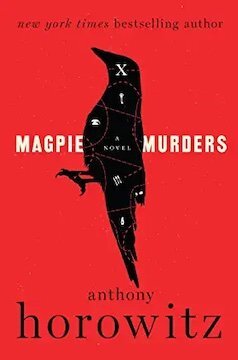
But my love of Christie’s clever tales explains why I was completely enthralled with Anthony Horowitz’s novel, Magpie Murders. I have no idea how the hell six years went by before I even knew about this book. It came out in 2017—in fact, there’s already been a sequel published, 2020’s Moonflower Murders. Somehow they both escaped my notice until I recently heard Horowitz on a podcast and Magpie Murders was mentioned.
Curious, I downloaded the ebook just before taking a long flight from the East Coast to Hawaii.
The book made those 12 hours of travel fly by, if you’ll pardon the unintentional pun.
Not a review
But this isn’t a review of the book—you’ll found tens of thousands of those. Some people loved it, while others didn’t care for it. And that’s what I wanted to focus on, and to see if you’ve experienced the same thing I did.
Because I freaking LOVED this novel. Not just because it was a mystery in the style of Agatha Christie—in fact, the book references the British writer multiple times; she’s an inspiration for both the story and the story-within-the-story—but also because I found the structure itself interesting and the mystery remarkably well-told.
I hesitate to use the word ‘mesmerized,’ which is perhaps a bit overused these days. The fact is, however, that I could not stop reading this damned thing. I found myself trying to regale my wife with how cleverly it was composed, even though trying to share one’s enthusiasm for a book with someone who really doesn’t care is frustrating for the teller and boring as hell for the listener. I understood that and I still insisted on talking to her about it.
When it was over, I was thrilled to discover the second book and instantly downloaded it.
But now to the issue that inspired this post.
I enjoyed this book so much that I instantly cataloged it in my brain as one of the ten best books I’ve read. That’s a mighty bold assessment, considering the vast number of books I’ve consumed in my life as well as my documented inability to remember too much about each book after some time has passed.
Nevertheless, it was just so damned good that I made a horrible mistake after finishing: I went online and looked to see if everyone felt the same way. I expected Magpie Murders to have garnered at least an overall score of 4.7 or 4.8 from the thousands and thousands of reviews.
So imagine my shock at seeing a consensus of 4.2. Granted, that’s still good—but far short of what I expected.
Why?
The obvious question this prompted from me was: Why? Why don’t more people score this book as highly as I did?
(Disclaimer One: I’m someone who thinks the entire online review system is garbage—but that’s another post altogether.)
I hated myself afterward, but I actually invested valuable minutes of my life sifting through the negative reviews. One or two people raised some valid points, I suppose, but not enough to warrant their one- or two-star grade.

(Disclaimer Two: I’m also someone who believes there’s a legion of people who are incapable of anything but one-star or five-star reviews. They have absolutely no sense of gradation; everything is either the greatest of all time or the worst pile of poo ever. Nothing in-between. I feel sorry for those people. Again, that’s another post.)
One reviewer claimed the first third of the book and the final third were excellent, but the middle was a mess. Another said the story-within-a-story was a “gimmick,” something with which I must strongly disagree. It could be a gimmick in some other novels, but, in this case, it was an extraordinary effect that just worked.
The point is: Why do we care when others disagree with our assessment? We take it personally, which is hilarious—I didn’t write the damned book.
But we see it as some sort of character slight, I guess; you somehow found the flaws in this work of art that I missed. Does this make you erudite and me ignorant? Or, flipping that around, does it make me an authority of artistic creation and you a pompous blowhard?
Ultimately, it’s all rather silly. My like or dislike of a work of fiction doesn’t require any input from you or anyone else. It’s between me and Anthony Horowitz, or between me and Agatha Christie. Or between me and Toni Morrison, John Lennon, Gwen Stefani, Britt Daniel, Lenny Kravitz, or Damian Kulash. Or fill-in-the-blank with any creative individual you care to name.
I appreciate that we all see works of art through different lenses, and we have our own particular (and sometimes peculiar) tastes. I’m glad I like something you don’t, and vice-versa.
But if you don’t like Magpie Murders, you’re clearly a moron.
*kidding* (mostly)
* * *

If this piece made you think—or even if it didn’t—perhaps you’d consider buying Dom a tea or a beer right here. It might help him get over the sting of having his favorite books ripped by total strangers.
March 25, 2023
The Wrong Path

Thought-A-Day calendars are generally pretty cheesy. (Today’s thought: You CAN do it!) For years, though, I’d receive them as Christmas gifts, and I’d dutifully flip that page every single day. It usually produced an eye roll from me.
Until one day it didn’t. On a random Thursday in August, I tore off the preceding page to find this Turkish proverb:
No matter how far you’ve traveled down the wrong path, turn back.
I stood in my kitchen looking at that page for a full minute, thinking. Then I thought about it on the drive to work. And, when I got home later, I preserved the thoughtful page on my bulletin board.
The proverb is both simple and profound—hell, for all I know that may be the very definition of a proverb. But this particular sentence hit me hard. At the time, I was involved in a personal relationship I had no business being in. I’d known it for quite some time but was reluctant to end it for one ridiculous reason: I’d invested so much time and effort.
Many times it’s not a personal relationship, but a professional one. You’ve been at a job for so long that it seems crazy to throw it away and start over again. All that seniority, all those benefits, all that accrued time off, and on and on.
It’s a pride issue. We add up all the months and years we’ve put into a personal or professional relationship and resist making a change simply because we hate to feel like a failure. In some cases, the hesitation is warranted; I would never advocate blowing up a relationship just because you’re in a temporary trough.
Sometimes, though, you just know it’s the wrong path. Everything screams that you need to make a change, but you won’t pull the trigger. Maybe you don’t want to give up because it will somehow—at least in your mind—invalidate everything you’ve built. Maybe you keep trying to convince yourself it’ll work itself out.
Or maybe you’re just plain scared. No shame in that, my friend.
Turning around on that path is hard, maybe one of the hardest things we’ll ever do. We’re afraid of how things will turn out, or how others will be affected. But let me assure you: If it’s the right thing to do, the sooner you do it, the better. All you’re doing now is marching farther and farther away from the right path, and you have only so many years to soak up the happiness that comes from being where you need to be.
(Although it’s just as cheesy as the calendar, I’m reminded of an old Diana Ross hit. She sang: “Do you know where you’re going to? Do you like the things that life is showing you?”)
After sleeping on the advice of that Turkish proverb, I ended the relationship. All of the fear and worry was for naught; it turned out to be one of the best decisions I’ve ever made. My new path brought me back into the sunshine.
Give some thought today to your own path. Is it the one you’re supposed to be walking? Is it bringing you the joy you should be experiencing? Is today the day you push aside the fear and plot a new heading?
Take a deep breath, and keep reminding yourself: It’s not failure; it’s a course correction.
* * *

If Dom has nudged you into turning around—and turning your back on the wrong path—consider buying him a tea or a beer right here. See you on the sunny trail soon.
Book Signings: The Highs and The Lows
Two words can strike fear into the hearts of most writers:
Book signing.
We’ve all seen the terrified and/or embarrassed authors, sitting behind a rickety card table in the far corner of a Barnes & Noble or an independent bookstore. A dozen or more of their books are stacked to one side, with one copy set up on a stand, cover-out, so passersby can glance at it before instantly deciding they want nothing to do with it or the poor author.
If you’re an experienced writer, you know what I’m talking about.
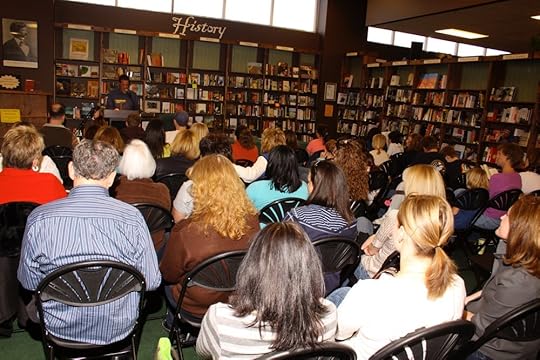
Dom Testa speaking at a signing for Comet’s Curse at The Tattered Cover Book Store in Highlands Ranch, CO.
If you’re in the process of becoming a publisher writer for the first time, you’re about to get an education.
On the surface, it sounds glorious. “I just published my first book, and the local bookstore has agreed to let me sign books this Tuesday afternoon!”
Then you get there, buzzing with nervous energy, and you set up your little space. You arrange the books more than once, trying to display your darling in the best possible configuration. You line up a series of pens, maybe a flyer or business cards, and—if you’ve really done your homework—a bowl of candy.
Bribery works. Not with everyone, but it works.
Those are some of the highs: Scheduling your first signing, setting it up, and living off that high.
The lows?
Well, it’s entirely possible you’ll sell one book. Or two. Or maybe even none.
And, when you’re packing up all the items you brought with you, and you see that the stack of books hasn’t been reduced by much, it can be absolutely deflating. You may even wonder if it’s too late to discard your dreams of bestseller lists and go back to working at a restaurant.
But here’s the real dope from someone who’s seen the highest of highs and the lowest of lows:
Don’t read too much into those first signings. And, while we’re at it, let me share one or two suggestions that might reduce the sting of despair.
I can tell you I’ve had signings with nearly 300 people—the line stretched out the door, and I thought (briefly) I was the second coming of John Grisham or Stephen King.
But my publisher also scheduled me into a signing at a small, indie bookshop in Houston without marketing it at all and without telling a soul. Even the store managers were slightly surprised when I showed up.
On that afternoon, I faced three rows of empty chairs. The only people who showed up were the store managers, an old high school friend of mine who stopped by for moral support, and some strange dude who just happened to wander by. It was so bad it was funny.
Almost every author you’ve ever heard of has done a book signing with a similar turnout. Boulder writer John Shors has one of the funniest stories ever about a first signing where, in the beginning, there was literally no one there. Dude had me laughing out loud.
So now that you know it happens to the best and worst of us, maybe you won’t be too hard on yourself if you only sell one book. But mostly I want to share two important elements of a successful book signing.
How to improve your book signing
One: I’d only schedule a signing if the book has at least a chance of appealing to a somewhat broad audience.

Dom discussing cover art during a book signing for Comet’s Curse.
You’ve written a romance novel, or a mystery, a thriller, or a business book that resonates with a lot of people? Your pool of prospective readers is deeper.
You’ve written a history of Slovakian coal miners from the 19th century? Well, it might be fascinating—but I’m sorry, other than friends or family, no one is going to queue up for that. It’s a tough business, man.
And number two: What are you actually doing at the bookstore besides signing your book?
The answer is: You’re giving a talk.
I don’t do many book signings these days, but, when I do, I make sure to give people a reason to show up other than to BUY MY BOOK, PLEASE.
Instead of just sitting behind that card table, I have the store set up a lectern and, if they can swing it, a screen for slides. I then use the opportunity to not simply talk about my book, but to reach out to the writer inside everyone else.
Because, in case you hadn’t realized it yet, millions of people have at least toyed with the idea of writing something. They may not have told anyone, keeping their dream hidden away like a deep, dark secret—but they’ve certainly thought about it. The problem is that few people know how to go about it.
That’s where my talk (and, perhaps, yours) comes in.
People wandering around a bookstore may not stop at a folding table to chat with a stranger, but if a podium is set up and it looks like it’s an actual “event,” then many will sit down and listen, especially if it’s a topic that tickles their inner fantasies—like writing a book.
During my quick sessions (usually only about 20 minutes or so), I talk about my personal writing experiences, how I was a closet writer (just like everyone in the crowd), and how I finally got the nerve to submit my work. Then I answer every question customers have about writing, editing, publishing, selling, anything. I may not know everything, but I can steer people to sources to fill in the blanks.
Use your book to tell your story
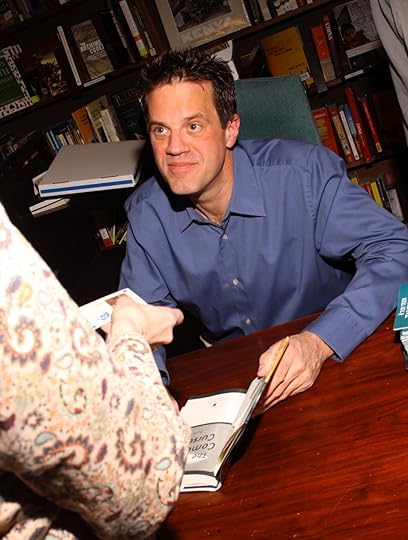
The examples I share regarding my own publishing history incorporate the details of how I wrote THIS particular book. That plays on the curiosity of the crowd. If they want to write a book someday, but they also happen to love spy thrillers, they could very well be game for purchasing the first book of my Eric Swan spy series.
The book talk, instead of simply a book signing, is a much more rewarding format for them and for you. Book readers and book writers, you see, are really the same species, and often it only takes a nudge to move a person from the first category to the second.
So, to recap, the best advice I can give for a book signing:
Make sure it’s a book with more than a tiny sliver of interest, and
Offer something of value, rather than just asking people to part with their money. Teach them something.
Oh, and still bring that bowl of candy. Every time.
* * *
If this article gave you an a-ha moment or encouraged you to get off your butt and write that book, then there are two things you could do. One, you could check out Dom’s book called The Color Of Your Dreams, which is essentially a primer on how to get off your ass and publish your first book.

You could also buy Dom a tea or a beer right here. It would be very appreciated.
March 24, 2023
Re-reading a book
I rarely read a book I’ve already read. In fact, of the nearly 1,500 books I’ve consumed through the years, I’ll bet fewer than 20 ever got a second pass.
And there are a couple of funny things about that fact.
For one, many of the books on the big list were fantastic, certainly worthy of a second, a third, or maybe even a fourth trip through.
Let’s face it, few of us think twice about re-watching movies we love. There’s one film in particular that I know I’ve watched at least two dozen times in my life, at least once every couple years.
What’s Different?
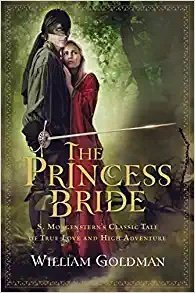
So what’s different about books? If you turned on The Princess Bride (the movie) right now, I’d gladly sit down and laugh through it again, even though I practically have it memorized.
And yet the book, which I also adored, I’ve read once.
Sure, there’s the time element. A movie lasts around two hours, while it takes the average American about five-to-six hours to read an average-length novel.
But if, as most of us agree, the book is almost always better, then why wouldn’t I make the commitment to explore some of these great volumes again?
Perhaps it’s simply because of that time factor, but for the opposite reason. Since it is more of a commitment, maybe I subconsciously want to use that time to absorb something new.
But that leads me into the second funny thing about my reluctance to re-read:
I don’t remember squat about books.
Are you that way? Probably not. Chances are you remember way more than I do.
There’s something screwy about the RAM in my head, I think. I can tell you whether or not I’ve read a book—I remember the titles, for sure, and whether or not I enjoyed them—but within a month of reading one, my memory banks are wiped.
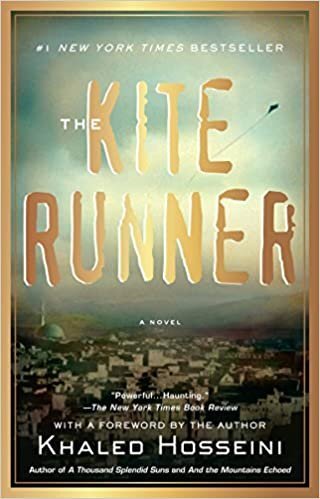
I was talking with my wife about The Kite Runner. I read it as soon as it came out in 2003, and I recall loving it. Even recommended it to people and featured it in my book club.
Today? I couldn’t tell you anything about the plot, the characters, or how it ends. Nothing. When pressed, I guessed that it took place in either Pakistan, Afghanistan, or India—but couldn’t be sure which.
Sure, with some books, I recall a few more details. The ending of To Kill a Mockingbird, for instance, would not be a surprise. But the majority of books? Practically nothing.
And that’s the funny thing, then. If I did choose to re-read a book, it would be like a whole new experience for me. And, going into it knowing that I loved it the first time, I could be guaranteed a good experience.
That certainly was the case with one my rare re-reads when, after 20 years, I finally broke out one of my all-time faves, Christopher Moore’s Lamb. It was practically all new to me and still held up—and still remains in my top ten.
An Art Collection
Look, I’m aware that some people—maybe you—read their favorites over and over again. I know someone who reads the same book at least twice a year, and has done so for 20 years.
I’m the weirdo who doesn’t. I have a home library crammed almost exclusively with one-time wonders, books I loved, but then were banished to the shelves. They’re now like an art collection I just glance at as I walk by.
So why do some people read their favorites over and over? Is it simply a comfort zone?
Is it the joy of discovering something new you hadn’t picked out during the first, fourth, or fourteenth read?
Is it because certain books, even fiction, are just so inspirational that you must revisit the lesson to get re-energized? I could understand that.
Is it fear that new stuff won’t—or can’t—stand up to your favorites? (I can’t get on board with that, by the way. There are just too many great books written every year.)
Perhaps one of these reasons, however, could prompt me to try it. To maybe go back to the bookshelf and pull down an old favorite, a book that’s moved with me from house to house but only been appreciated once.
Maybe every third book could be a re-tread.
I think I’ll do it. And maybe I’ll start with a virtual visit to Afghanistan with that kite runner.
Yeah, I cheated just now and looked up the country.
* * *
Here are some of the books mentioned in this piece. Disclaimer: These are affiliate links, which means with any purchase, I’ll make a few cents. Doesn’t cost you a penny more, but those cents help to support this blog. (Plus, I think you’ll really like them.) So thank you!
The Princess Bride, by William Goldman
The Kite Runner, by Khaled Hosseini
To Kill a Mockingbird, by Harper Lee
Lamb, by Christopher Moore
Bob Dylan doesn’t suck

Bob Dylan ain’t my thing. I don’t enjoy the music or the lyrics, his unique vocal style is difficult for me to listen to, and the haggard-artist look—on anyone—always struck me as contrived.
When he’s lauded by many as one of America’s greatest poets, performers, and visionaries, I shrug. To put it simply, I don’t get the adulation.
Notice I didn’t say, “Bob Dylan sucks.”
In life, there are things we all agree should be labeled as sucky. Cancer sucks. Deadly hurricanes and tornadoes suck. Assholes who create and propagate computer viruses suck.
But lumping your personal taste, especially anything in the arts, into the realm of suckiness is just arrogance. Loudly proclaiming “Mashed potatoes suck!” is not only crazy talk—for mashed potatoes are like manna from heaven—but it arrogantly elevates your opinion over that of anyone or everyone else.
Here’s the thing: I used to be that guy.
Back in the day, if asked, I would tell people, “Bob Dylan sucks.” I’d proclaim the shittiness of The Beach Boys and Brussels sprouts, too.
Until the day I finally grew up and realized the difference between “The Goonies sucked” and “That movie’s not for me.”
And, surprisingly, it became freeing. It took me a while to figure out why, but here’s the best way I can explain it.
When you tell a worshipful fan of Will Ferrell that his movies suck, it practically invites argument and/or outrage. Or a punch in the face.
Why? Because you didn’t insult Will Ferrel; you insulted them. You may as well have said, “Your taste is for shit. What’s wrong with you? God, you’re stupid.”
When you tell that same fan, “Yeah, it’s just not my thing,” then you’re practically inviting sympathy rather than anger. Now it’s not that they’re stupid, but that you’re evidently not wired properly. There’s something wrong with you, rather than with them.
And people are okay with that. Believe me, they’re totally okay with that.
The beauty is that both examples say exactly the same thing: You like this, and I don’t. One way makes the other person seem to be a faulty human, while the latter makes you the defective part.
Saves a lot of time and saves a lot of senseless arguing—because you’ll never, ever convince me that Brussels sprouts should even exist on this planet.
Nobody gets mad, we all get on with our lives, and Bob Dylan gets on with his mumbling.
* * *
If this post—in your opinion—didn’t suck, maybe you’d be interested in buying Dom a tea or a beer, right here. That would not suck at all.



